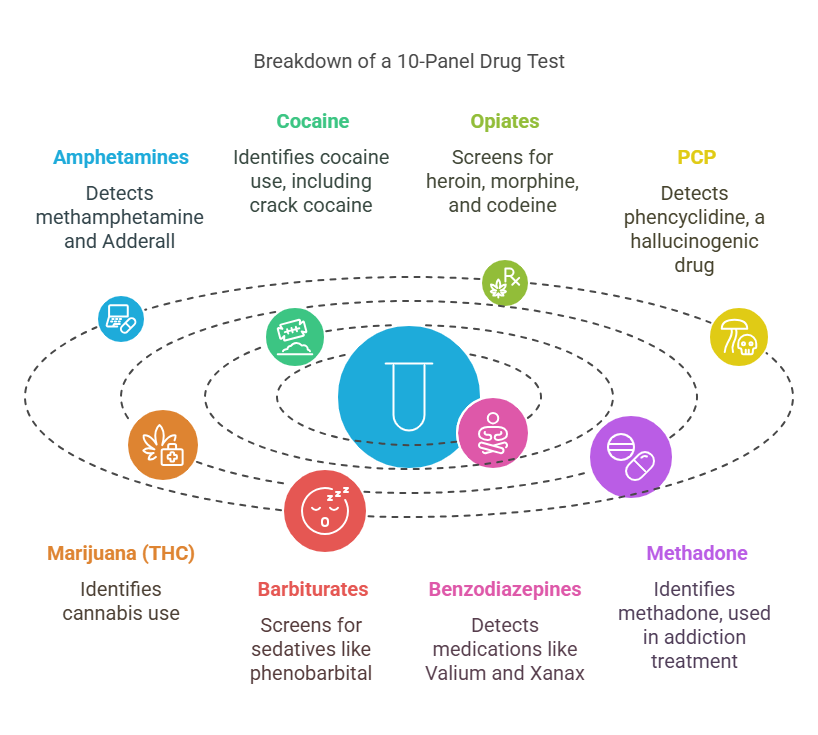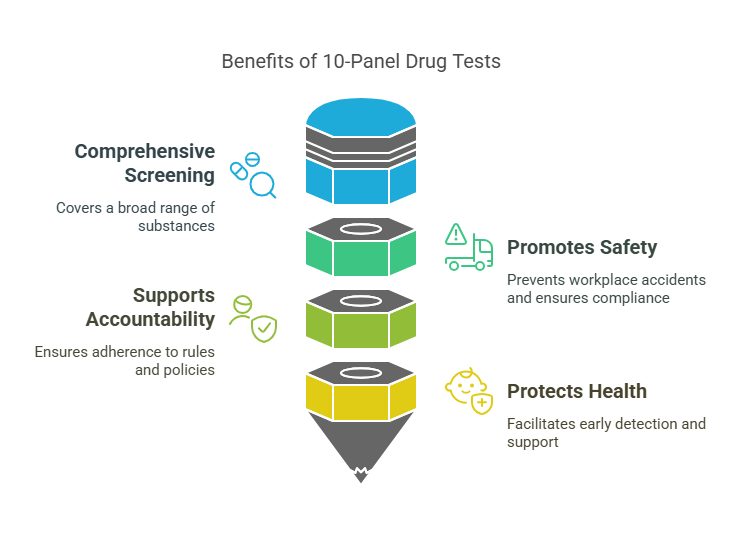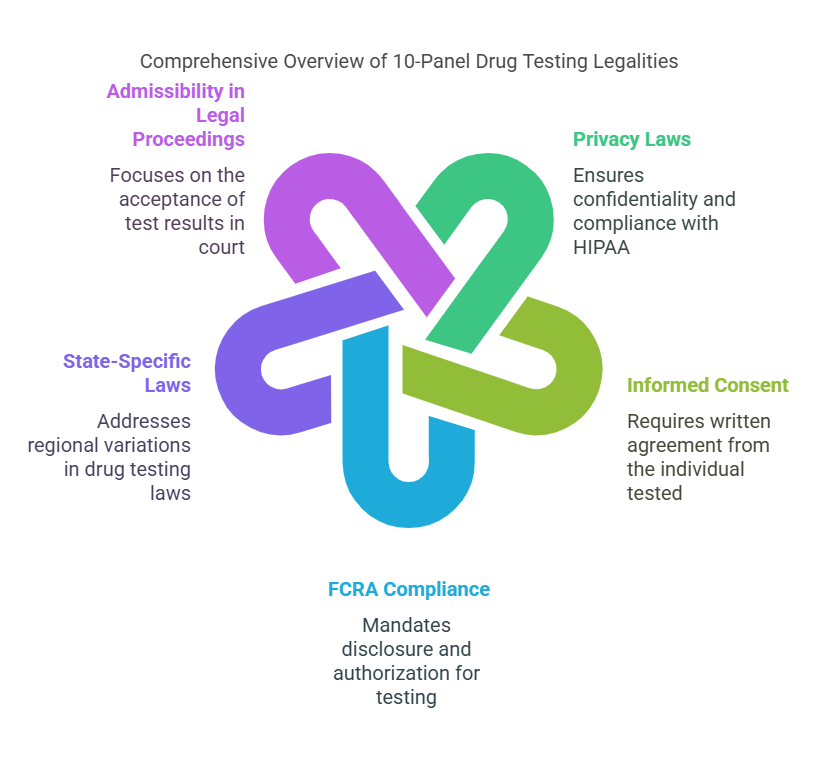Top Substances Detected in a 10 Panel Drug Test

What Is a 10-Panel Drug Test?
A 10-panel drug test is a comprehensive screening method used to detect the presence of ten different substances in an individual’s body. It is a widely used tool for identifying recent drug use, offering employers, legal authorities, healthcare providers, and individuals insight into whether a person has consumed specific drugs or misused prescription medications.
The “10-panel” designation refers to the number of substance categories included in the test, making it one of the most thorough drug testing options available. This test is particularly effective for environments requiring heightened safety and responsibility, such as workplaces and legal proceedings.
What Substances Does a 10-Panel Drug Test Detect?

A 10-panel drug test screens for the following categories of substances:
- Amphetamines – Includes drugs like methamphetamine and commonly prescribed medications like Adderall.
- Cocaine – Detects cocaine use, including crack cocaine.
- Opiates – Identifies heroin, morphine, and codeine use.
- Phencyclidine (PCP) – A hallucinogenic drug often associated with violent or erratic behavior.
- Marijuana (THC) – The active ingredient in cannabis, including recreational and medicinal use.
- Barbiturates – Sedatives such as phenobarbital, commonly used for sleep disorders or seizures.
- Benzodiazepines – Medications like Valium and Xanax, prescribed for anxiety or insomnia.
- Methadone – A synthetic opioid often used in addiction treatment programs.
- Methaqualone – Commonly known as Quaaludes, though rarely prescribed today.
- Propoxyphene – A pain reliever, now discontinued in many countries due to safety concerns.
These substances include a combination of illegal drugs, commonly abused prescription medications, and substances with high potential for misuse.
Where Are 10-Panel Drug Tests Commonly Used?
- Workplace Drug Testing
Many employers require 10-panel drug tests during the hiring process or as part of random drug testing programs. Industries like transportation, healthcare, construction, and law enforcement rely on these tests to maintain a safe and drug-free workplace. - Legal and Court-Ordered Testing
Individuals involved in legal cases, probation programs, or child custody disputes may be required to undergo a 10-panel drug test as part of compliance with court orders. - Rehabilitation and Recovery Programs
Drug treatment centers use 10-panel drug tests to monitor patients during their recovery journey, ensuring accountability and progress. - School and Athletic Programs
Some schools and sports organizations use these tests to discourage drug use among students or athletes, promoting fair competition and healthy lifestyles.
Why Are 10-Panel Drug Tests Important?

- Comprehensive Screening
A 10-panel drug test covers a broad range of substances, making it a highly effective tool for identifying drug use across various categories. - Promotes Safety
By identifying drug use, these tests help prevent workplace accidents, ensure legal compliance, and promote safer environments in schools or healthcare settings. - Supports Accountability
Employers, legal authorities, and rehabilitation programs can use 10-panel drug tests to ensure individuals are adhering to rules, treatment plans, or workplace policies. - Protects Public and Personal Health
Early detection of drug use can help individuals receive necessary support or treatment, reducing risks to their health and well-being.
Comparison: 10-Panel vs. Other Drug Tests
While there are various drug testing panels available, the 10-panel test is preferred in scenarios requiring a more thorough analysis. Here’s how it compares to other common drug tests:
| Test Type | Substances Tested | Use Case |
|---|---|---|
| 5-Panel Drug Test | 5 (e.g., amphetamines, cocaine, THC, opiates, PCP) | Standard pre-employment screening. |
| 7-Panel Drug Test | 7 (adds barbiturates and benzodiazepines) | Used in industries requiring more detail. |
| 10-Panel Drug Test | 10 (adds methadone, methaqualone, and propoxyphene) | Comprehensive testing for safety-sensitive roles. |
The 10-panel drug test is especially valuable for industries or situations requiring detailed insights into drug use beyond basic screenings.
Detection Windows for 10-Panel Drug Tests
The detection window for each substance varies based on the frequency of use, the method of testing, and individual metabolic factors.
| Substance | Detection Window |
|---|---|
| Amphetamines | 1–3 days |
| Cocaine | 1–4 days |
| Opiates | 1–3 days |
| Phencyclidine (PCP) | 1–7 days |
| Marijuana (THC) | 3–30 days (varies by use) |
| Barbiturates | 2–4 days |
| Benzodiazepines | 2–10 days |
| Methadone | 1–7 days |
| Methaqualone | 10–15 days |
| Propoxyphene | 1–2 days |
Understanding these detection windows helps employers and organizations schedule testing at the right time to obtain accurate results.
How Is a 10-Panel Drug Test Conducted?
A 10-panel drug test involves a straightforward process to collect and analyze a biological sample for detecting the presence of drugs. Here’s how the test is conducted:
1. Sample Collection
The most common method for a 10-panel drug test is urine testing, but other biological samples like saliva or blood can also be used in specific cases.
- Urine Test:
- The individual provides a urine sample in a sterile container.
- To maintain integrity, the sample is collected under controlled conditions to prevent tampering or contamination.
- Other Methods:
- Saliva Test: Suitable for detecting recent drug use, often used in roadside or workplace testing.
- Blood Test: Rarely used for routine screening due to its invasive nature but offers more precise results.
2. Laboratory Analysis
Once the sample is collected, it is sent to a certified laboratory for analysis. The testing process typically involves the following:
- Step 1: Initial Screening
An immunoassay (IA) test is conducted first. This method uses antibodies to detect the presence of drug metabolites. It is cost-effective but may produce false positives, requiring further testing for confirmation. - Step 2: Confirmation Testing
If the initial test detects drugs, the sample undergoes a more accurate test, such as Gas Chromatography-Mass Spectrometry (GC-MS) or High-Performance Liquid Chromatography (HPLC). These methods confirm the presence of specific substances and eliminate false positives.
3. Results Reporting
Results are typically classified into three categories:
- Negative: No drugs were detected.
- Positive: Drugs were detected, and the result is confirmed by additional testing.
- Inconclusive: The sample could not provide definitive results, often requiring retesting.
The results are usually available within 1–3 business days, depending on the testing facility and method used.
Why Are 10-Panel Drug Tests Important?
1. Ensuring Workplace Safety
Industries with safety-sensitive roles, such as transportation, healthcare, and construction, rely on drug testing to reduce risks of accidents caused by impaired employees.
- Employers can implement 10-panel drug tests during pre-employment screening, random testing, or post-incident investigations to maintain a drug-free workplace.
2. Comprehensive Screening
The inclusion of both illegal drugs and commonly abused prescription medications makes the 10-panel drug test one of the most thorough drug screening methods available.
- For example, the test screens for benzodiazepines and barbiturates, which are not included in smaller panels like the 5-panel test.
3. Legal and Compliance Requirements
In some industries, such as transportation or aviation, federal regulations require regular drug testing. Employers can use 10-panel tests to meet these compliance standards.
- Tests conducted by certified labs follow strict guidelines, ensuring accuracy and adherence to state and federal laws.
Exact Background Checks: Your Partner for Drug Testing Services
At Exact Background Checks, we understand the importance of reliable and accurate drug testing. Our services are tailored to meet the needs of employers, organizations, and individuals by providing:
- Fast and Accurate Results
Our advanced testing methods and certified labs ensure precise results with quick turnaround times. - Compliance with Legal Standards
We adhere to all federal and state regulations, ensuring that your testing programs are legally compliant. - Customizable Testing Solutions
Whether you need pre-employment, random, or post-accident drug tests, we can create customized solutions for your organization.
Benefits of Using Professional Drug Testing Services
While it’s possible to conduct drug testing in-house, professional services like Exact Background Checks offer significant advantages:
| Aspect | DIY Drug Testing | Professional Services |
|---|---|---|
| Accuracy | Prone to errors or false positives. | Advanced methods like GC-MS ensure precision. |
| Legal Compliance | Risk of non-compliance with laws. | Fully compliant with FCRA and state laws. |
| Speed | May take longer due to lack of resources. | Quick turnaround times with certified labs. |
| Customization | Limited options for different tests. | Tailored solutions for various testing needs. |
Investing in professional drug testing services ensures reliable results, protecting your organization from liability and maintaining a safe environment.
Understanding False Positives and False Negatives
Although 10-panel drug tests are highly accurate, there are occasional cases of false positives (indicating drug use when none exists) or false negatives (failing to detect drug use).
- Causes of False Positives:
- Certain medications or foods can mimic drug metabolites (e.g., cold medicines containing pseudoephedrine can mimic amphetamines).
- Over-the-counter medications like ibuprofen may trigger false positives for THC.
- Causes of False Negatives:
- Attempting to dilute or tamper with samples.
- Testing outside the detection window for certain drugs.
To minimize errors, professional services employ confirmation testing using advanced methods like GC-MS.
Applications of 10-Panel Drug Testing
1. Pre-Employment Screening
Employers often use 10-panel drug tests during the hiring process to ensure candidates can perform their roles safely and responsibly.
2. Random Drug Testing
Organizations implement random drug testing to discourage substance use among employees and promote a drug-free workplace culture.
3. Legal Cases and Probation Monitoring
10-panel drug tests are frequently used in legal cases, such as probation monitoring, child custody disputes, or compliance with court-ordered drug testing.
4. Rehabilitation Programs
Drug treatment facilities use these tests to monitor participants’ progress and ensure adherence to recovery plans.
Legal Aspects of 10-Panel Drug Testing

When conducting 10-panel drug tests, it’s crucial to understand the legal implications to ensure compliance with various regulations. Here are key legal aspects to consider:
1. Privacy Laws and Employer Responsibilities
- Privacy Concerns: Drug testing, especially in the workplace, involves sensitive information that must be handled with confidentiality. Employers must follow regulations such as the Health Insurance Portability and Accountability Act (HIPAA) when handling medical information.
- Informed Consent: Most employers must obtain written consent from the individual being tested. This ensures that the individual is aware of the test and agrees to participate voluntarily. In many cases, failure to obtain proper consent could lead to legal issues, especially in legal or employment contexts.
- Reasonable Suspicion Testing: Employers are allowed to test employees if they have reasonable suspicion of drug use. This could be based on observable behavior, accidents, or other workplace safety concerns. However, employers must ensure that the suspicion is based on solid evidence and avoid discriminatory practices.
2. Compliance with the Fair Credit Reporting Act (FCRA)
The FCRA regulates how employers use background check information, including drug tests, for hiring purposes. It mandates that:
- Disclosure: Employers must inform candidates in writing that a drug test or background check will be conducted.
- Authorization: Candidates must provide explicit written consent before the test is conducted.
- Notice of Adverse Action: If a drug test result negatively impacts the hiring decision, the employer must notify the candidate and provide them with a copy of the results.
Employers should ensure they follow FCRA guidelines to avoid legal pitfalls. Failure to do so could lead to lawsuits or fines.
3. Legal Regulations and State-Specific Laws
In addition to federal regulations, there are state-specific laws that govern drug testing. For example, some states have “Ban the Box” laws, which prohibit employers from asking about a candidate’s criminal history, including drug-related convictions, until later in the hiring process. These laws could also impact how drug test results are used.
Some states also limit the scope of testing, only allowing certain substances to be tested in certain scenarios, such as testing for marijuana in states where it’s legal. Employers must be aware of these varying laws to remain compliant.
4. Admissibility in Legal Proceedings
Drug test results are often used as evidence in legal cases, such as custody battles, probation hearings, and DUI cases. The admissibility of a drug test result in court depends on:
- Chain of Custody: Ensuring that the sample has not been tampered with during the collection, storage, or analysis process.
- Accuracy: Using validated testing methods, such as GC-MS confirmation testing, to ensure that the results are reliable.
- Compliance with Regulations: Ensuring that the drug testing process follows legal and industry-specific standards.
Inaccurate or improperly handled drug test results may not be admissible in court.
FAQs About 10-Panel Drug Testing
What substances does a 10-panel drug test detect?
A 10-panel drug test screens for the following substances:
- Marijuana (THC)
- Cocaine
- Opioids (e.g., morphine, heroin, codeine)
- Amphetamines
- Methamphetamines
- Benzodiazepines
- Barbiturates
- Phencyclidine (PCP)
- Methadone
- Propoxyphene
This comprehensive testing panel is designed to identify both illegal drugs and commonly abused prescription medications.
How long do drugs stay in your system for testing?
The detection window for each drug varies depending on the substance, frequency of use, metabolism, and the type of drug test used. For urine tests:
- Marijuana: Can stay in your system for 1-30 days, depending on usage frequency.
- Cocaine: Typically detectable for 2-4 days.
- Opioids: Detectable for 1-3 days.
- Methamphetamine: Can remain for 2-5 days.
- Benzodiazepines: Usually detectable for 1-7 days.
Are 10-panel drug tests legal for pre-employment screening?
Yes, 10-panel drug tests are legal for pre-employment screening, provided they comply with federal, state, and local laws. Employers must follow procedures for obtaining consent and ensuring confidentiality. However, employers must also be aware of state-specific regulations, particularly in places where marijuana use is legal for recreational or medical purposes.
How accurate are 10-panel drug tests?
When conducted by a certified laboratory using proper testing methods (such as GC-MS for confirmation), 10-panel drug tests are highly accurate. However, false positives and false negatives can occur, particularly if individuals are using substances that are similar in chemical structure to the drugs being tested. This is why confirmation tests are critical for reliability.
What happens if I fail a drug test during employment screening?
If you fail a drug test during employment screening, the outcome depends on the employer’s policies. Some employers may offer the opportunity for a retest or provide options for rehabilitation programs. Others may immediately withdraw the job offer or terminate current employees, especially in safety-sensitive industries. It's important to know your rights and the employer’s policies regarding drug testing.
Conclusion
The 10-panel drug test is an essential tool used to identify drug use in various contexts, including employment screening, legal proceedings, and probation monitoring. With its ability to detect a wide range of substances, it provides employers and organizations with valuable insights while helping to maintain safe and healthy environments.
By using professional drug testing services, such as those offered by Exact Background Checks, employers can ensure compliance with legal regulations, achieve accurate results, and protect their workplace. Understanding the legal and practical aspects of drug testing is crucial for both employers and employees.
For more reliable and comprehensive drug testing services, trust Exact Background Checks to meet your needs, ensuring that the process is handled professionally, accurately, and with full legal compliance.



